 THE
REASONS WHY RWANDA GROWN COFFEE IS OF SUPERIOR
CUP OF QUALITY THE
REASONS WHY RWANDA GROWN COFFEE IS OF SUPERIOR
CUP OF QUALITY |
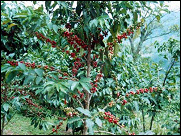
· Coffee farming is deeply rooted in Rwanda
tradition: since the introduction of coffee at the
beginning of the 20th century, Rwanda farmers have
realized that the crop matches our agro-ecological
environment. Through coffee farming we create wealth
with a minimum knowledge consisting of digging a
whole in the ground et planting a coffee seedling.
The crop grows naturally, with minimum care consisting
of weeding and mulching ;
· More than 40% of Rwanda coffee is high
altitude grown: Rwanda coffee is grown from "a
thousand hills" terroirs. Rwanda coffee takes
enough time to mature, which makes it dense and
rich in flavor, becoming number one in quality;
· Personalized growing practices are possible
depending on customer preferences: for a given cluster
of coffee farmers, it is possible to standardize
cultural practices to match a specific consumer
requirement. The minimum use of agro-chemicals means
less pollution and higher potential for organic
coffee production.
· Only best arabica varieties are grown and
properly post harvest handled: Rwanda Coffee is
exclusively arabica, with the best bourbon varieties.
There are continuous efforts to develop top cup
quality and high yielding arabica varieties. Rwanda
coffee is wet processed, dry processing being deliberately
prohibited by coffee farmers.
· Numerous professional partners with quality
in focus: Farmers as well as exporters and other
intermediates within the coffee industry are primarly
focusing on quality. Coffee farmers are particularly
highly motivated to pursue high quality standards;
· The Government Support to production and
quality improvement initiatives: The Government
of National Unity has adopted, since 1998, the New
Policy for the Development of the Coffee Industry
that aims at increasing coffee production and quality
as well as fairly allocating revenues generated
by the coffee industry.
 THE
ROLE OF OCIR COFFEE IN THE COFFEE INDUSTRY THE
ROLE OF OCIR COFFEE IN THE COFFEE INDUSTRY |
OCIR CAFÉ was created in 1964 with a mission
of supervising coffee related activities in the
country, from production to commercialization. It's
mission has recently been reviewed to concentrate
mainly on policy formulation and implementation,
with particular emphasis on developing professionalism
within the coffee industry, as well as marketing
and promotion. Since its creation, the role played
by OCIR CAFÉ has resulted in comforting and
perpetuating the coffee culture in Rwanda.
The current mission of OCIR CAFÉ is as follows:
· To participate to the process of elaborating
policies and strategies for the coffee sector, and
follow up their implementation;
· To set up quality norms and classification
systems, quality control and delivery of Origin
Certificates;
· To collect and disseminate pertinent information
on the coffee sector;
· Promote a good working environment within
the coffee sector;
· To take part to coffee research and extension
related activities;
· To support coffee farmers associations
involved in coffee production, processing, as well
as marketing;
· To arrange for training of all coffee sector
stakeholders;
· To participate to international negotiations
related to coffee matters and follow up the implementation
of the decisions taken.
 IMPORTANCE
OF THE COFFEE INDUSTRY IN RWANDA IMPORTANCE
OF THE COFFEE INDUSTRY IN RWANDA |
It is believed that coffee was introduced in Rwanda
in 1904 by German missionaries. Around 1930, a considerable
interest in coffee developed as it was the sole
revenues generating commodity for rural families.
Up to now, coffee has played a considerable role
in the socio-economic development of the country,
despite the collapse of world coffee prices at the
international market.
Table
of the evolution of coffee generated revenues
 SOME
KEYS CHARACTERISTICS OF COFFEE FARMING IN
RWANDA SOME
KEYS CHARACTERISTICS OF COFFEE FARMING IN
RWANDA |
· Coffee is grown by small scale coffee
farmers estimated at 400.000 in number, with an
average of 165 coffee trees per farmer;
· Only Arabica coffee varieties are grown,
with the predominance of bourbon and typica varieties;
· Varieties cultivated: Harrar; POP3303/21;
Jackson 2/1257; BM 139.
· Altitude range from 1200 to 1800 meters
above sea level;
· Rainfall range from 900 to 2200 mm per
annum;
· Soils are generally good, with high yield
potential for coffee. About 30% of soils under
coffee cultivation are of volcanic origin;
· Planting spacing: 2000 to 2500 coffee
trees per hectare;
· Cultivated area under coffee farming:
28,000 hectares;
· Yield: 0.7 to 1 tone/hectare;
· Flowering: September - October;
· Harvesting season: March - July;
· Post harvest treatments: wet processing
methods;
· Period of exportation: All year long;
· Caffeine content: 1.3%;
· Weigh of bags: 60 Kg;
Table
of the evolution of coffee production

 COFFEE
PRODUCTION ZONES COFFEE
PRODUCTION ZONES |
The country is subdivided into several coffee production
zones depending on their productivity potential.
The Kivu Lake region (Cyangugu, Kibuye and Gisenyi
Provinces) is the best coffee growing zone in terms
of productivity.
|
 COFFEE
PRIMARY PROCESSING IN RWANDA COFFEE
PRIMARY PROCESSING IN RWANDA |
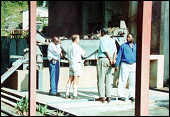
Primary processing of Rwanda coffee is carried out
by individual farmers using the wet process method.
Dry processing of coffee is prohibited. Most coffee
is semi-washed, as individual farmers can not afford
setting up individual coffee washing station.
In some areas, farmers grouped in cooperatives have
started setting up coffee washing stations so that
they can improve quality by producing Fully Washed
coffee. The Government has also expressed its commitment
to improving coffee primary processing infrastructure,
through assistance in securing funds for setting
up new coffee washing stations.
Currently, The Government has adopted a new strategy
aimed at improving the quality of the Country produced
coffee so that it can be sold at the specialty coffee
market.
 COFFEE EXPORTATION COFFEE EXPORTATION
Five coffee exporting companies: RWANDEX, RWACOF,
SICAF, AGROCOFFEE, and CBC. CBC is new coffee exportation
company created in 2002.
In the year 2000, Rwanda coffee was mainly exported
to Germany, Holland, Switzerland, Belgium, The United
States of America, Spain, and France.
 PROFFESSIONAL
ORGANIZATIONS WITHIN THE RWANDA COFFEE INDUSTRY PROFFESSIONAL
ORGANIZATIONS WITHIN THE RWANDA COFFEE INDUSTRY |
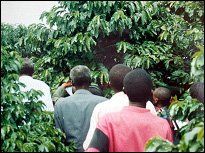
Coffee organizations
· Abahuzamugambi: Maraba Coffee Farmers association
;
· Cooprokaki: Kigembe Coffee Farmers Association;
· Assocamu: Muhura Coffee Farmers Association;
· Iakt: Tumba Coffee Farmers Association;
· Cocagi: Gishoma Coffee Farmers Association;
· Iakaga: Gatare Coffee Farmers Association;
· Ishyabakaga: Gafunzo Coffee Farmers Association;
· Acki: Kinyamakara Coffeee Farmers Association;
· Dbk: Karama Coffee Farmers Association;
· Duterimbere: Akduha Coffee Farmers Association;
· Uproca: Kayove-Nyamyumba Coffee Farmers
Association;
Tel. 0852 156
· COOPAC: Gisenyi Coffee Farmers Association
Tel. 54.01.23 Fax: 54.03.34
· UCAR: Gitarama Coffee Farmers Union
Tel. 0851 1240
· Iakb: Birenga Coffee Farmers Association
· Abishyizehamwe: Rwamatamu Coffee Farmers
Association;
· Kopakama: Mabanza Coffee Farmers Association;
· COOPCAFE: Kibuye Coffee Farmers Association;
Tel. 570258 Fax: 570258
· Abakundakawa: Rushashi Coffee Farmers Association;
· Abakamu: Mugambazi Coffee Farmers Association;
· Dukundekawa: Musasa Coffee Farmers Association;
· Inyongeramusaruro: Tare Coffee Farmers
Association;
· Kopakabi: Bicumbi Coffee Farmers Association;
· Abakundakawa: Ndusu Mountain Coffee Farmers
Association;
· Abaharanira Amajyambere: Nyamutera Coffee
Farmers Association.
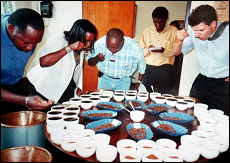
 COFFEE
EXPORTERS COFFEE
EXPORTERS |
AGRO-COFFEE INDUSTRIES
Tel. 51.46.26/7
E-mail: agrocoffee@yahoo.com
RWACOF
Tel. 57.58.72
E-mail: rwacof@rwanda1.com
RWANDEX
Tel. 57.51.80
E-mail: rwandex@rwanda1.com
SICAF
Tel. 57.02.92
Fax: 57.02.93
CBC
Tel. 517 958
Fax: 517 957
E-mail: coffee-bc@hotmail.com
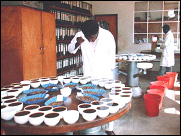
 COFFEE
PRODUCTIONS ENTERPRISE COFFEE
PRODUCTIONS ENTERPRISE |
ETABLISSEMENT ENAS
Tel. 574564
Fax: 574564
SAKE COFFEE PLANTATION
Tel. 82450
or 0850-7679
ETABLISSEMENT KANOCK
Tel. 570258, Mob. 08300686
Fax: 570258
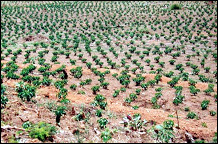
|

